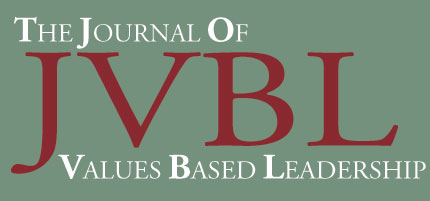- CONTENTS:
- Table of ContentsLetter from the EditorThe Making of a “Philanthropreneur”Dynamic Leadership: Toolbox for the Values-Based EntrepreneurCapitalism Revisited: The Interplay of Motivation, Inspiration and RiskWorkplace Bullying and Ethical LeadershipPrinciples for Accountable Leadership – The AA1000 Series
- THE MAKING OF A “PHILANTHROPRENEUR”

Trevor Field, Director, Roundabout Outdoor, Founder, Playpump® Water System
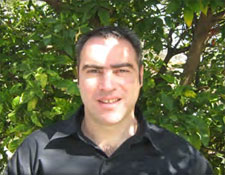
Mark Melman, Co-Director, Roundabout Outdoor Johannesburg, South AfricaTREVOR FIELD, DIRECTOR, ROUNDABOUT OUTDOOR, FOUNDER, PLAYPUMP® WATER SYSTEM
MARK MELMAN, CO-DIRECTOR, ROUNDABOUT OUTDOOR
JOHANNESBURG, SOUTH AFRICABackground
Trevor Field, a retired advertising executive, and his partner, Mark Melman, whose business background is also grounded in advertising, have formed a business alliance that has in turn forged partnerships with the Kaiser Foundation, Steven (founder, AOL) and Jean Case of the Case Foundation, the World Bank, the United Nations, and the Clinton World Initiative, to combat the global crisis of lack of access to clean water experienced by over 1 billion people. As a result of many trips to rural villages located in the Eastern Cape of South Africa, Field realized that the burden of collecting water fell mainly to the women and girls of each household – a time-consuming chore which took them away from their educational studies and advancement.
Field then partnered with an inventor and created the “PlayPump®” – basically a children’s merry-go-round that pumps clean, safe drinking water from an underground aquifer as the children spin. The PlayPump® water storage towers are ensconced by four paneled billboards, two used for commercial advertising space to generate revenue to help pay for the system’s maintenance and provide local jobs, with the remaining two panels dedicated to the communication of social messages, predominantly to promote HIV and AIDS awareness.
PlayPump® International is a 501(c) 3 organization in the U.S. with the partner organization Roundabout Water Solutions situate in South Africa. Its stated mission is to help improve the lives of children and their families by providing easy access to clean drinking water, enhancing public health and offering play equipment to millions across Africa. Their goal to install 4,000 PlayPump® Water Pumping Systems in 10 countries in sub-Saharan Africa by 2010 — bringing the benefits of clean water to approximately 10 million people — closely aligns with the stated objectives of the United Nations’ Millennium Development goals. Most recently in August, 2008, the PlayPump® Water Pumping System was showcased at the 2008 Water Week Conference held in Stockholm, Sweden.
The remaining portions of this article are based upon an interview with Trevor Field conducted by editor Elizabeth Gingerich in March, 2008, in Johannesburg, South Africa.
Interview, March 15, 2008
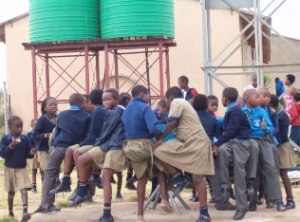
Q: I had the privilege to visit and experience first-hand the power of the PlayPump®, as I was spun by at least 20 school children during recess in the community of Diepsloot (an informal settlement in the Gauteng province, just North of Johannesburg).
Diepsloot where you went is still urban; Lesotho is more of a rural environment. They have 790 students in that school, mostly orphans. They will take anyone for a spin on these PlayPumps®. That’ll do your stomach well. They whiz you fast. And the boys will get on, and spin you the other way. But that’s what I like about the PlayPump®. It’s attractive to the children.
Q: I am curious as to what events stimulated you to do what you do – your upbringing, work and social experiences, environmental dynamics. Also, with respect to the installation of the PlayPump®, do you regularly employ experts or is all the work conducted by trained local laborers?
We use professional ground scientists or geologists to test the holes which are generally the starting point of installing a system. Regardless, you have to understand that local knowledge is very important in assisting to find where the best places are to dig. The locals are the best sources of knowing where the fracture lines exist and sometimes they have an 10 uncanny ability to use a divining rod to locate the best places to bore. So many times they show us where to dig, and sure enough it’s 35 ft down — right on the money. It is these resources we rely upon, together with our professionals.
Q: When you single out a new area to install a PlayPump® Water Pumping System, are you and your team, as well as your particular objectives to be accomplished, accepted by the local villagers?
The people are incredibly warm. They have nothing. We work together with them. Keep in mind that according to the facts and statistics of the World Health Organization, 6,000 people die each day from contaminated water sources. In fact, I think it is 1 in every 3 people who is negatively impacted by water-borne diseases.
Q: Through Engineers-Without-Borders, we have drilled wells in sub-Sahara Africa, specifically in the desert region of Northwestern Kenya, but have relied upon windmills instead. You apparently have used the windmill concept and turned it on its side to achieve a greater rate and flow of water?
What is the wind like there?
Q: There used to be consistent 10-plus mile per hour winds, day and night, but with recently altered weather patterns, presumably due to global climate change, the winds have stopped for the first time in recorded history in that area and are completely dormant throughout the daytime. That is why our chapter is retrofitting the windmills with solar motors. Is this also why you decided to harness another source of renewable energy?
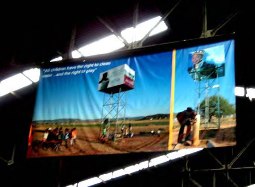
This is why, with the PlayPump®, we don’t have to worry about the climate. We are simply harnessing the power of child’s play. Another problem with the retro-fits would be as soon as the scrap dealers realize that there is silver in the solar panels, they will most likely invade the province, and steal the panels. This is a huge problem for us in Southern Africa right now. Where there’s money involved, these problems will occur.
Q: The PlayPump® Water Pumping System seems to have generated substantial world attention. I toured your factory and have seen a working site in action, and am more amazed than ever. I noticed while walking through the factory, several oversized banners suspended from the ceiling, depicting children at play on the PlayPump®. This must provide an incentive to your factory workers that the project they are manufacturing is contributing to the betterment of the human situation?
Our passion comes from the children. There is no doubt, at least speaking for myself, that’s what keeps me going — knowing that they have clean water to drink. The PlayPump® Water Pumping System is encouraging new construction of schools and hospitals as well. Everything around the systems is changing. In planning the PlayPump®, we had to discover where the water might be. The first strike was at 22 meters; the second at 36 meters. Each 11 one produces 18,000 gallons of water per hour. Loads of water. The PlayPumps® are not just used for the schools any more; they are used for growing crops.
Q: I understand that your business is comprised of two for-profit entities and one nongovernment organization?
Yes, the not-for-profit is PlayPumps International alongside Roundabout Outdoor.
Q: At this point, I would simply like to hear the story of Trevor Field. What were your formative influences?
I was born in Birmingham, UK. My father was in the fire brigade and to get promoted, you typically would have to wait for someone to pass away, like any state job. So with his job, we’d have to move from county to county. Like a gypsy. While I was born in Birmingham, I lived in Aylesbury and Bletchley and I ended up in London when I finally left my parent’s home.
Q: How old were you when you left home?
Nineteen, I think.
Q: Did your mom work outside the house?
She has been a housewife her entire life. Her parents died when she was 14. She then had to look after the kids. She looked after her brothers and sisters and never got a proper education. She’s not a doctor, but very worldly and wise.
Q: Do you have any brothers and sisters?
I have two brothers, both younger. I was the first child.
Q: How about any affect on you with respect to a religious upbringing. Did your parents advocate any religious instruction?
I’m not political, I’m not religious. I’ve got my own ideas about what religion should be. They were both Christians. We weren’t really church goers, but we were just taught to do what is right. I’m spiritual, yes, I would consider myself to be a spiritual person. When I’ve had a really good day, I go outside and look up at the stars. And I realize how far away they are, and it puts everything into perspective. I was looking at Mars the other night. I gave myself a Christmas present of a high power telescope, which is my hobby.
Q: Did you go to college?
I went to college for a short time. After 2 years, then I joined Telkom. I went into telecommunications. It was a nice company to work for in those days. It was outdoors, you could start out installing telephone cables and end up becoming a telecommunications engineer. Then, at 24, two of my mates and I moved to South Africa. In those days, we continued to put up telephone cables in South Africa. We would erect transmission from the towers to the TV studios. I was 24, making good money.
Q: What enticed you to make South Africa your new home?
The weather — no question. I first went to Cape Town, which I consider to be God’s own country. Unimaginable beauty. The best steaks, beers, beautiful girls, cold beer. What do you think a 24-year old single boy would want? I thought I was in paradise. We worked in Cape Town and went back to the UK just to visit. I was in and out all the time. When I got married I was 29 and now have been married for 28 years, but am currently separated. I have 2 daughters. My oldest is 24, born in 1984.
Q: Did your wife work outside the house and was she an influential factor for what you do?
Yes, she was a computer programmer. She’s always been a very alternative person, especially in the spiritual arena. But she has been supportive of my work and my work has completely changed my life.
Q: How did you go from advertising and telecommunications to what you do now?
Eventually, with your telecommunications skills, you teach others and you find that you’ve just taught yourself out of a job. So then I didn’t have a job anymore. I went back to selling. When I was younger, I worked in a hi-fi store, selling appliances. I could sell anything. I don’t know why, but I did so even when I was a kid. I remember when I was a kid, I used to make plasticene models of trucks and sell them to the man who came to collect rent. And my mother was always embarrassed. I remember doing that quite clearly.
Q: Was this all commission based?
Oh yes. It’s provided the necessary incentive. The more you sell the better you fare. In fact, I remember going back to visit my folks. It was Christmas time and I had done so well with my job that my employer had given me a couple bottles of scotch and a turkey. I was on the train heading north, the weather was dreary, the conditions cramped and everyone on the train was so miserable, so I popped the tops off the scotch and passed it around. I remember doing this and everybody was then in a good mood.
Q: When you traveled as a young man, how did you react to the abject poverty you may have witnessed?
I didn’t see a great deal. In those days you know, we were working in the more sophisticated parts of town. We were in television transmission. Working in the city at Holiday Inns, businesses like that. We didn’t go out into the bush that much. So for those first few years, I did not see a great deal — that is, of poverty. What I did see, what really started to strike me occurred during a fishing trip I took to the East Coast, part of South Africa. I went to Transkei, which is also known as the “Wild Coast.” You need a 4x4 just to get there. That’s where I went on a fishing trip with 3 of my mates. We set out on a Friday. We took the usual supplies: 1 loaf of bread and 7,000 beers. We had everything we needed and off we went. As we were driving, we passed through a place called the Lusikisiki which was pretty remarkable. We were driving down a road which was pretty remote. To the side was a windmill with a concrete reservoir. The bottom, which stores poured water, was made out of breeze blocks which are like bricks, but are not very stable. They were cracked so there was no water in them. At this particular site, there were at least a half dozen women just standing around the site. As we drove past, I just looked at them.
At this time in my life, I was married, so I was probably about 35 I guess. I had seen poverty before, but there was something different about this first time I saw these ladies just standing there as we were going fishing during this “boys’ weekend out.” We fished the high tides. The high tides come at unpredictable times. You get up and go fishing for three hours very early in the morning, you go to sleep and wake up, and start all over. When we were driving back past that place, those women were still standing there. I said to myself, “You’ve got to be kidding!” Have they been there the whole time? Or did they go home and come back?” They were still waiting for water to come. And I’m thinking to myself “No way! This is not right.” Often when I’d go fishing, I’d see women and it was always women, never the guys, so grossly disproportionate to their gender, as if beasts of burden. That’s one of my phrases: “beasts of burden.” Nothing tells me why it’s they who have to get the water but they do. So I got this notion in my head that there must be a better way to collect water. I’d seen young girls and older women who simply can’t do it, and if you’ve ever tried to carry one of these jugs, most would be incapable of carrying the water. That’s hard work. Again, I thought there must be a better way of doing this. Do you remember in the old days when cars were started by handle? You’d turn the handle and the car’s engine would turn on? That’s how you’d start the motor — why couldn’t we invent something like that? Use the windmill to turn. But when the wind’s not blowing, you can’t turn it, and then you’ll have problems, especially during the night.
Then something of a coincidence happened. My father-in-law — a farmer — came to visit me and my wife in Johannesburg. There was an agricultural show in Pretoria. I drove him out to the show. There were cattle and huge sheep there, and as we walked around to a particular exhibition we met a man named Ronnie Stuiver. He had a model that looked like a roundabout. As you turned it, water ran out a tube into a bucket, and I thought to myself, “That’s fantastic!”
Q: How much time had passed since you had seen these women before you attended the agricultural show?
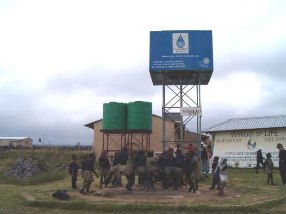
Probably years. By that time I taught myself out of another job, so I went back to what I was doing in sales. I got a lucky break and joined a publishing company. Instead of selling hi-fis, washing machines and air dryers, I started selling ad space for magazines which is the hardest thing to sell, but the most rewarding. It’s harder to sell than insurance — insurance is tangible; you can go and trade it. I used to sell dreams, hopes, and goals for the future. I was a National Sales Manager in that respect. So with all the advertising space I needed to sell, I would go to you, and put your product in Omni Magazine, which was one of the magazines I was working on. Then other products would surface. So we would meet and I would take that new account and put that on an advertising board which shields the water tanks filled by the PlayPump®. Placing advertising on a PlayPump® was easy. So after examining Ronnie’s invention, I asked him what the disadvantages were. He replied that I could not re-create the system cheaply enough to compete with his system.
Q: Had he patented it yet?
Yes, he patented that. But he couldn’t make it cheap enough; it was too expensive. He couldn’t make it cheap enough to compete with a hand pump. It was cheaper than a windmill, but much more expensive than a hand pump. Ronnie’s invention was flat, like a plate with two arms on it, and it was designed for kids. I used to call it the ankle cutter because it was just that far enough off the ground, just enough to get your feet stuck under. I could see that this would not be a great thing. Of course in the bush, you have so much dust that drops into the grease and without modification; this invention simply would not work.
Ronnie invented the mechanism, copying the basic concept from another system, but had a different design. He had used a swatch plate which moves in a circular motion, one way. I was then able to secure the marketing rights for this modified system at the same time I was working for the magazine.
The original invention was designed to pump water to fill one bucket at a time. My idea was to re-design the system to enable it to pump water into a storage tank, and then to sell advertising space on panels surrounding those tanks. Women are the ones who collect the water and make the purchasing and buying decisions for the family. So females between the ages of 25 to 40 constituted the target market.
Q: How do these women have any spending power, especially in light of the extreme poverty in which they live?
They buy tea, sugar, bread — staple products. They aren’t going to buy a BMW but they have to buy bread. This was the time that Nelson Mandela had been released from Robin Island. The ANC (African National Congress) was legalized; it was just the right timing. The advertising agencies — which up to that point had ignored the black masses — suddenly recognized this new market as fashionable and potentially lucrative. And I had a method to do it. I would approach my friends in the advertising business, target women and provide fresh drinking water to communities to prevent sickness. Plus women who have a harsh time of life, who could not attend school. And therefore, for kids, we developed the PlayPump®. They had no concept of what a merry-go-round was. When they first sat on it, they expected it to do something on its own power. They didn’t realize that they had to move it.
Q: Who were your first advertisers?
Colgate was one of the first.
Q: Did that then generate enough income to build a complete system?
No, I paid for it myself. I got to a stage where I believed in it so much that I decided to finance the system. I couldn’t give up my day job while I was building the first two. My wife monitored the first two sites for me; she was in a place called Masinga which is really very remote. Women walked around topless and with spears, sort of a National Geographic type of scene. It was 23 kilometers to get to the site and the directions were somewhat obscure: “Turn right at the big white rock”… “Get to the tree with the yellow leaves on it, turn left there”… “Go across the river, keep on going, it’s on the right.” After the first two were selffinanced, the advertising revenue kicked in.
Q: Was the government helping out at this point?
This was something they were interested in. So after we installed the first two PlayPump® systems, we waited to see if any part would be stolen or would break down. The people loved it; when we returned it was really successful. We installed advertising panels on the storage tank for bread — Blue Ribbon was the brand used there — so I then solicited advertising from an outfit called SASCO. SASCO is a different brand of bread that had not previously been offered for sale in this region. We persuaded them to stock their brand there.
Q: Was this advertising meant to open up the market for increased competition?
It was research I had to do. I got them to advertise on the tanks before I got them to supply the bread to four stores. Then I went back a little later to check on the aisles with the bread; 78% of the bread stocked had already been sold. We are pummeled with advertising request overloads in the city. But when just one sign says “Sasco” bread and these women are walking towards it and staring at it, an impression is made. The women have a psychosomatic link between what they’ve seen on the billboard and what they’ve seen in the marketplace or they like the PlayPump® and associate the bread with improving their lives so they patronize the company producing the product which is being advertised.
Q: Did you engage in a dialogue with them to determine their interests and the effects of the ads?
No I didn’t. I just looked at what was happening; it didn’t matter how it happened or why. But the fact of the matter is that it was happening. And that’s when I went to the World Bank and also when another light bulb turned on. This was in 1999. I’ve always had this belief that if I could change the minds of people — even with such matters as rudimentary as bread — we could implement some changes to improve lifestyles and health habits.
So I went to the World Bank and said “if we could change people’s minds about the purchase of bread — knowing that rural young women and young girls have the highest risk of infection of AIDS for lots of reasons — we can take this target market and make it a moral target market to combat HIV by supplying messages to these purchasers. The World Bank was sponsoring a development marketplace competition and I entered the competition with “The Roundabout Outdoor Initiative,” emphasizing not only the generating of clean water, but spreading messages to women who have kids and young girls and boys to try to keep them HIV negative…try to keep everyone HIV negative. I realized that I couldn’t dictate that a person must be faithful to one partner and wear condoms. Advertising social messages was the place to start. Rural kids were becoming sexually active at a younger age. When it gets dark and there is nothing else to do, this happens. So, these messages are just not targeted to adults, children have to be included. Trying to educate the children was one of my objectives. We entered the World Bank competition in January 2000 in Washington D.C. along with 3,000 other people from all over the world. It was the first time that I had entered the competition and we won.
Q: Was this competition part of the World Bank’s clear water initiative program?
I wasn’t aware of that. We won the competition in February 2000 and were awarded $165,000. With that money, we were able to construct and install 30 additional PlayPumps®.
Q: Did you encounter any trouble enticing more advertisers to jump onto the bandwagon?
No. I had actually done what I set out to do and that was to address the AIDS awareness program even though before I went, I really knew very little about it. In fact, I visited the Department of Health here in Johannesburg to meet the Director General and the Secretary of Health as the official governmental agencies established to confront this issue. There was already an awareness campaign actively promoted by the government. So I met with the advertising manager and as a salesman needing additional monies, I simply walked in and said, “Hello, all I want you to do is print me the ads, you pay for the print and I’ll let you have the advertising space for free.” We were able to acquire 40 pumps and all of the latest HIV/AIDS awareness messages which were displayed on the panels surrounding the water tanks on the top part of the tower. There are four panels on each tower: two sides are dedicated for social messages on HIV awareness and two for profit. And on the other side we have Telkom messages dealing with Telkom, they bought them all. So Telkom was paying us. So we succeeded. We got the models and 40 pumps in the ground, all working, and we have HIV/AIDS articles opposite the commercial advertisements. We really did like that because rural people approach these signs at 360 degree angles. So if a villager were to approach from the north or south, HIV messages would be seen and from east and west, Telkom advertising is prominent. Really, no matter which angle you approach, you see both. If you put Kellogg’s on one side and Anglo-American on the other side, it would be confusing. So, that’s the way we’ve done it: north and south, east and west are always the same.
This project turned yet another direction after we won the competition. I was driving home one night, my cell phone goes off and guy on the other end says, “Hi Trevor, this is Dr. Michael Sinclair from the Kaiser Family Foundation in D.C. We’ve seen what you’ve done with the PlayPump® and like it a lot. We want to give you $5 million at your discretion…. No, I’m serious. We sponsor the health systems trust.
Q: And your reaction?
We won the World Bank competition with our developing marketplace and clean water initiative and they knew we were behind the project. It’s my opinion that if you want something done, use the private sector. You are on the line to pay the salaries and meet expenses. If you want to get things done you go with a for-profit organization because that way you have the incentive.
Q: You had the incentive.
Sinclair, says to me, “But Trevor, you know you have to understand this, your mother probably likes you a lot, but I don’t know you from a bar of soap and I’m in D.C. and you’re in Africa, so go and make a partnership with someone I do know and can understand.” So I went and consulted with a man named Ronnie Kasrils and at that time, he was the Minister of Water Affairs. He was also in the military wing of the ANC. They called him “the General.” He’s a great guy. I explained our situation to him and he said, “I love it. We’ll do it.”
Q: Is this the same branch of the government that’s undertaking the “working for water“ project?
Yes, but Ronnie’s no longer the minister anymore. Now with this additional funding and the governmental approval, we installed over 100 PlayPump® systems. So the initial venture of my wife and me produced 2 systems, then we increased the number to 40, and now, with these events, 100.
Q: Was this one government connection sufficient to appease the Kaiser Foundation?
Yes, by then we had a public/private partnership with the Department of Water and Forestry. It was their competence to bring water to the rural areas; it has changed since then. It is now a provincial competence which has made it much more open to public input.
Q: And you didn’t apply for a grant from Kaiser, did you?
No, it just happened.
Q: So, the only thing you applied for was your entry in the World Bank competition?
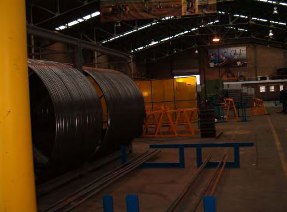
Yeah, then when we were trying to install additional pumps, we sold commercial advertising space. In this way, we’d have enough money to repay the capital cost of the equipment. We would secure a 3-year contract for advertising and we’d match this with a 3-year repay on the capital costs, the difference between the advertising and what we’d have to pay for that property. But then we arrived at the stage where people were donating money to install the pumps — people from all over the world would just make a donation and they’d send it to Roundabout. Then it got me thinking, you know, so I spoke to Ronnie Kasrils, Minister of Water Affairs, and I said to him, “Ronnie, I’ve got a question for you. When we put a pump in the ground, we don’t own it, and if we got an American to pay for it, they don’t own it. The people who own it are the people living where it is. It’s theirs. So, what’s the incentive to give — could you give a tax break or something?” Then he called me back and he said that he had spoken to Trevor Manuel, the Minister of Finance, and that Mr. Manuel had indicated that the law was about to change in November to allow companies like ours to be able to apply for PBO status.
Q: What’s “PBO” status? Public Benefit Organization.
It would allow a tax break similar to America’s 501(c)(3) notfor- profits. So he said, “Just write a letter to me and I’ll forward it to the finance minister.”
Q: So, did you change the status of the organization from for-profit to not-for-profit?
Not yet. I just wrote the letter. Then I got the phone call from SARS which is like your IRS. They said, “We want you to come see us in Pretoria.” I just about had a heart attack. I thought my tax was in question. So I went there and there were four Advocates in suits and there was a letter on the table and it was from Trevor Manuel to Ronny Kasrils referring to me. And they said the Minister has asked them to look into my question and asked me, “So what do you want us to do?”
Q: They were there seemingly at your discretion?
I explained to them that I wanted to change the law so that when people or organizations give us money, we can declare a 100% tax break for them. And they looked at me like I was 19 an idiot, and said to me, “Mr. Field, we’re not going to change the law for you, but what we’ll do is to tell you how to change your structure to get that benefit. What you do is keep Roundabout Outdoor as a for-profit entity since it already has locus standi and then open Roundabout Outdoor II or something else and we’ll make that second entity the PBO. We’ll give you PBO standing so you can give people a tax break and that company would then be regarded as an NGO, a section 21 not-for-profit.
Q: So you have your version of the IRS giving you legal and organizational advice?
Well, I said to him, “So how long does it take to get PBO status?” And he said, “Oh about two years or so.” I said, “How do I jump in the queue?” The minister wants this to happen so we’ll see what we can do. We got it in 2 weeks. Now all the money comes in through the PBO. Fast forwarding to PlayPumps International — that’s the NGO. Since then, we have been working quite nicely. Mark and I raised about $14 million between the two of us from big organizations.
Q: How did you find Mark Melman and what direction did Roundabout take after winning the World Bank competition?
He found us. Mark used to work for a company called GMR, another advertising organization. We both shared a common friend at that time. He liked what we were doing so he bought 10% of our company. He put his money where his mouth was and joined us.
Being a previous winner, I was invited back to be a judge at the World Bank Competition and did this for a couple of years along with a lot of public speaking. Then the Case Foundation found us in D.C. — that’s Steven Case, the founder of America Online, AOL, and instrumental in the Warner Brothers merger. He and his wife started the Case Foundation. So, I got a call from one of his people that he and his wife wanted to see the PlayPump® and they made the big mistake of letting me get into their car with them to go to the site — a big error. In the car were the driver, Steve Case, Jean Case, and I for an hour and a half. I do not have a problem with talking for that amount of time. We drove out to a site and I took them to a rural community where kids are literally burned to pieces, little girls have been prostituting themselves to try to get a loaf of bread, crippled kids are prevalent. It’s a pretty rough place. Jean just sort of freaked and they got on a plane and went back home. I really didn’t think that I had done that well when they were here. Then I received a phone call from the foundation’s Senior VP saying, “Jean just loved the PlayPump®, loved the company, loved you, just loved it all and just wants to make a difference. So we would like to donate, if you would present this formally.”
Q: What year was this?
This was in 2004. So we worked for about 2 weeks putting a presentation together to specifically include target countries. We included all the east coast of Africa which consists of 10 countries, trying for 4000 pumps, at a cost of $60 million. We then flew to the States and showed the presentation to Jean and her advisors and they all loved it. We said it would cost $100 million to do all the drilling, but final costs were then reduced to $60 million. We generated a lot of publicity from the Cases.
Q: I’ve noticed that you have been on a speaking tour, including several college campuses. You recently spoken at the University of Michigan’s business school in Ann Arbor?
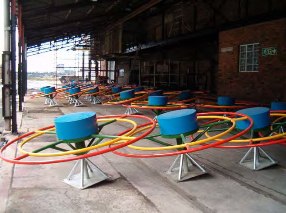
Yes, I was in Michigan and instead of beginning with a long lecture which would put them all to sleep, I simply asked for questions. There were 5000 people there and nobody left. We’ve generated quite a lot of donations from other organizations in the States through our contacts at PlayPumps International — that’s when we transformed Roundabout II into PlayPumps International. Now we have a D.C.-based PlayPumps so the Americans are able to receive their tax breaks. We had a big announcement just last year — First Lady Laura Bush announced that the Bill Clinton Global Initiative would supplement the Case commitment by pledging $16.4 million to the initiative. Out of nowhere, the First Lady of the United States announces that she’s going to give this amount and soon thereafter, pop singers Jay-Z and Beyoncé contacted us with a commitment to dedicate concert revenues to this project. During this time, I was also able to meet Bill Clinton and Prince Harry. It has just gone berserk!
Q: So now you have 900 systems in South Africa?
No, more than 1000.
Q: And, from what I understand, also a couple hundred in Mozambique and now you’re looking northward and have been contacted by India?
This initiative has possibly grown into… We want to make the world wet.
Q: But in coming to my next point, population is directly related to pollution. If the PlayPump® allows women more time to become educated, women perhaps will no longer function as beasts of burden nor be regarded as second class citizens and will then have more say in family planning decisions. Of course, this transformation might take a few more generations for that to happen around here.
Women are the target and remember that she is the educator and disseminator of information. So, if you put the information on the PlayPump® advertising panels that tell her how to look after where she lives without throwing batteries onto the ground when they are flat. If you educate the woman, she’ll educate her kids and it will get better.
Q: So in terms of that educational process, maybe she’ll choose not to have those 5 or 6 children; perhaps she will opt for the use of contraceptives.
And maybe her husband will not beat her up if she tells him to wear a condom.
Q: So with a PlayPump®, you’re basically empowering women who could then act as catalysts for change?
Absolutely, she is the medium, there is no other medium, and the PlayPump® is the only self-sustainable mechanical water extraction device on this earth.
Several friends of mine back in England, all businessmen and lawyers, went to the Grand National and one of them says, “Do you know that there are over 1 billion people in this world who don’t have access to water?” In response to this disturbing statistic, they came up with this idea to start their own bottled water company and call it “ONE” water. They sell the water in the U.K. and give all the profits, not just 5%, all the profits to us. They’re launching in Australia, Singapore, Malaysia, Hong Kong, and the States as we speak, Duncan Goose is the founder of this company. I was with him in D.C. last Wednesday The Cases were there, as well as 200 other people including 10 ambassadors, the head of Bristol-Meyer-Squid and the CEO of Coca-Cola — all of them are behind this. I spoke to these people and announced what I’m going to do. Duncan introduces himself and states that his company would pledge its net profits of $4 million and if every water company on this planet would do what he does, then with respect to the 1.1 billion people who don’t have access to water, we’d solve that problem in 23 weeks. Now that’s power. The big organizations that are purely profit-driven can’t compete with Duncan because he donates all his profits. Instead, they have shareholders that they must answer to. Through his advertising efforts, Manchester University, having one of the biggest faculty in England and over 35,000 students on campus, has decided to stock only “ONE” water.
Q: With so many people who are not Trevor Field and who look at the world in its current condition and recognize the futility of so many temporary band-aid solutions, with your program and what you know you are able to accomplish, when you lie down at night, does your mind keep going?
Yes, I switch it off at about 2 o’clock in the morning and I’m thinking about other ways to harness this power, such as the production of electricity. Thinking about the electricity I really have a bug up my sleeve. You can’t harness this energy without batteries. Do you remember when you bought your first cell phone? It came with a battery about the size of a radio and after charging it, you would get about 20 minutes of air time if you were lucky. Now the battery is like an after-dinner mint and lasts for 2 weeks, and that’s just the development of technology. Soon we’ll have batteries that will power whole institutions, even the size of this hotel. Not necessarily solar energy, but battery technology energy is on the forefront. You have to use the technology to store energy. That is stuff for the future; we are nowhere near that now. I’m into basic water. I’m not into people bathing, washing clothes, and washing the car. I’m into people drinking water and staying alive, that’s it. Whether water is 25 meters or 200 meters away. All I want is for little girls to be able to go to school and get an education so they don’t have to spend all day collecting water before they go to school. Little girls who are entering puberty not to stay at home because they’re embarrassed because they can’t wash their hands. If you want to increase a girl’s education, you put water in the school — that’s an absolute no-brainer. Why does a girl have to suffer because of her gender? I don’t care if we upset many people with my ideas and advertising. If I can only save 1 life, one, I’ll be done. Do you know what the best thing about the PlayPump® is? Boys love to play on the pump. Boys don’t collect water. But that’s exactly what they’re doing with their playing and the girls say, “Go ahead and spin” and that’s how water is collected. And the girls are sitting there saying, “Go ahead, carry on, you’re pumping the water for us” but they don’t know. So what we’re doing is we’re beginning to switch the gender responsibility with respect to water collection.
Q: How do you feel about yourself and your role in the world?
I wish I had this brain in this body when it was 17.
Q: So do you think a number of years have been wasted?
Yes. I’m 56 now, 57 soon. My time on the planet is the problem. My big buzzword is “limited time on the planet.” There’s so much to do; I can’t do it all. I can only talk about it. But I can franchise this idea.
Q: Some might say that that sounds too capitalistic for the world.
You’re looking at capitalism. You know why I do this; I’m a “philanthropreneur.” I do good, I make good.
Q: One of my colleagues, an ethicist, has categorized 3 types of values-based leaders: those who are selfish (self-serving leadership), self-less (servant leadership), and self-full (valuesbased leadership). You seem to be the latter, much like Bill Gates. You are doing good in the world, yet you are earning a dollar for yourself.
Yes, it’s not like I am walking down the street giving away suitcases full of money.
Q: But unlike Bill Gates, you seem to be more grass-roots oriented.
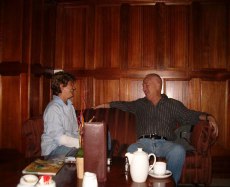
Yeah, myself and Duncan. Duncan mortgaged his house twice and I did the same on mine. I don’t think about money. You can’t take it with you. You can only drive one car, live in one house, eat one meal. You can have multiples of these, but you can only use one at a time. Basically that’s the way I see it. You can have all of this; you can have 500,000 pairs of shoes, but you can only wear 1 at a time. So what’s the point? It’s all very nice to have it, but it’s all very pointless to me. I just have one focus, just like Duncan has one focus. We want to put this pump out to as many people as possible. We want to improve it. We want it to generate electricity; we want it to microwave a chicken if we can. We want it to do whatever we are able to make it do, and we don’t want to keep it to ourselves, we want to give it to the world. For myself and my family, we can still be comfortable as human beings. It really makes a difference to so many people and hopefully we’ve done a lot. It’s worth it, very satisfying, and amazingly exponential in the amount of people served. I remember when I first looked at this water pump; I could never imagine that this is something that could possibly change the world. I remember when I came up with this idea and everyone was laughing. They’re not laughing now.
Q: And you never question yourself? That’s basically how you’ve done everything?
It’s like smoking, I used to smoke 60 times a day — that was me. I smoked like a chimney. And one day I just decided to stop. I’m a cut and dry, simple person. When I commit to do something, I go and do it. I own no Blackberry; I hate laptops. I just like to keep a personal life of my own.
Biographies
Trevor Field: Mr. Trevor Field, born in Birmingham, U.K., is a British businessman with extensive experience in the outdoor advertising industry. He has also worked extensively in the printing and publishing industries, both in South Africa and in the U.K. From 1971 to 1974, he joined British Telkom and trained as Senior Technician in transmission. In 1975, Mr. Field immigrated to South Africa, where he worked for the next five years installing transmission cables to allow TV programs to be viewed in South Africa. He subsequently joined First General Media in 1980 and was National Sales Manager for its group magazine both in South Africa and in the United States. In 1995, Mr. Field decided to focus full-time on manufacturing and installing Roundabout PlayPump® systems. He installed the first 2 PlayPumps® in Kwazulu Natal. He joined forces with Mr. Paul Ristic in 1996 and Roundabout Outdoor was formally established in 1997. He is currently working to increase the functionality of the PlayPump® model. To date, over 1,200 PlayPumps® have been installed by PlayPumps International, predominantly in South Africa and Mozambique, with plans to expand both their presence and usage currently in progress.
Mark Melman: Mr. Mark Melman, born in South Africa, is a businessman with extensive experience in the outdoor advertising industry. Prior to joining Roundabout Outdoor (Pty) Ltd, Mark was a founding member of GMR Transit Media which specializes in commuter advertising.
